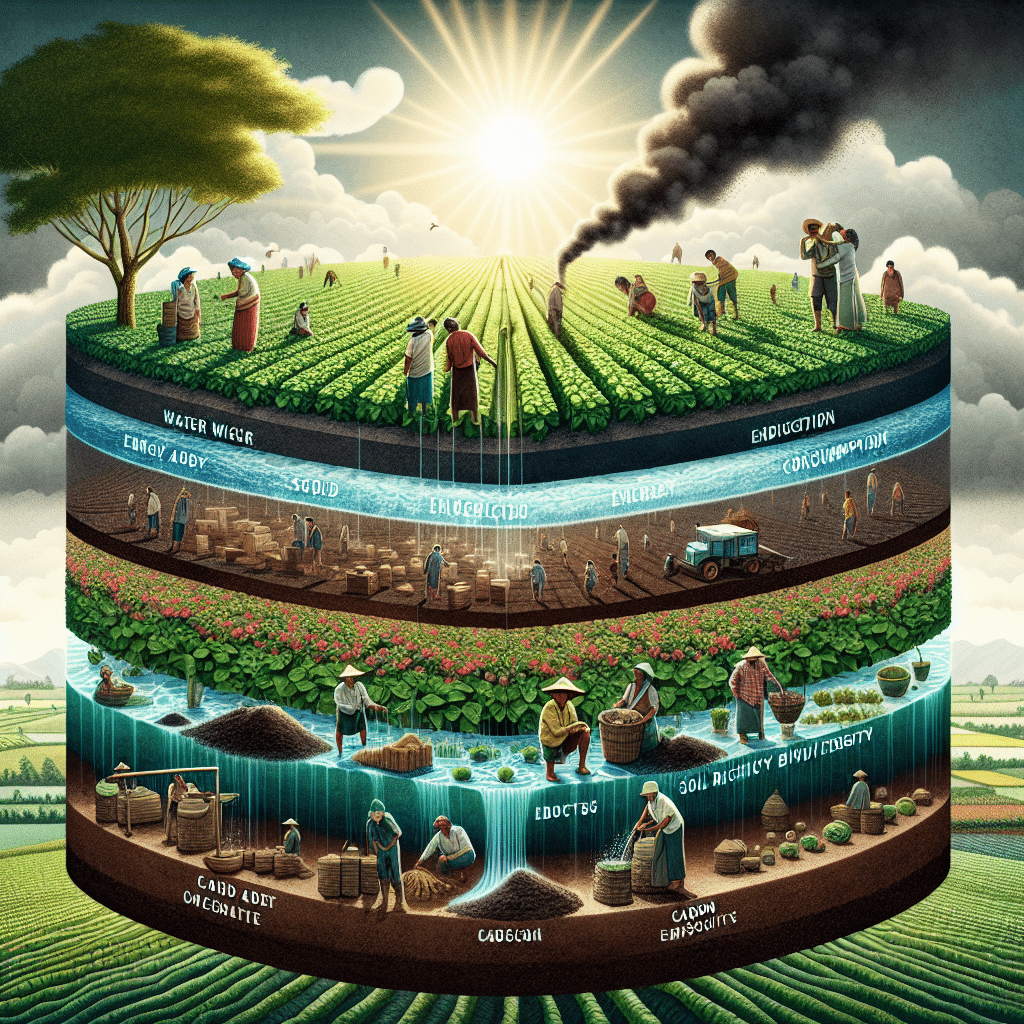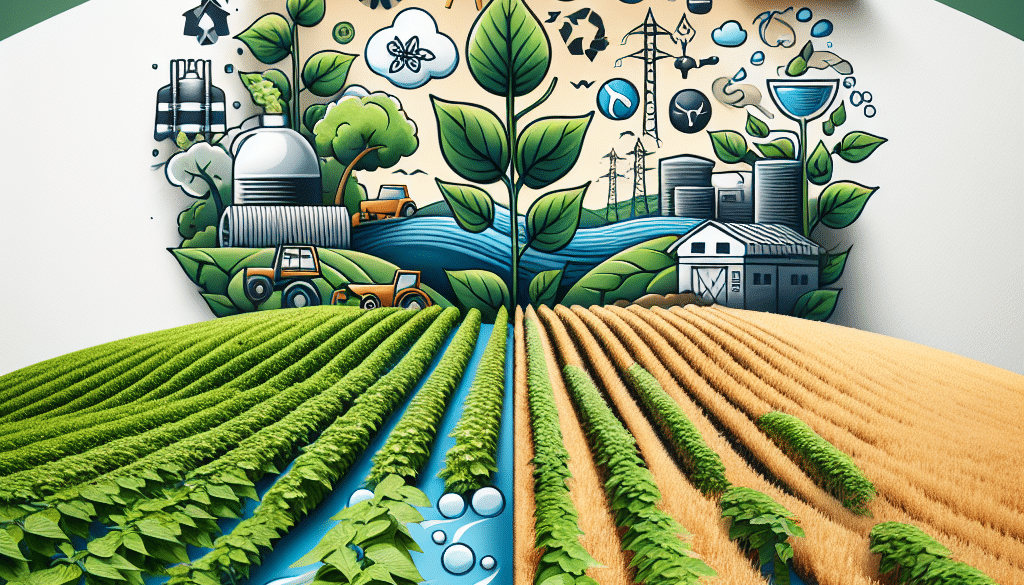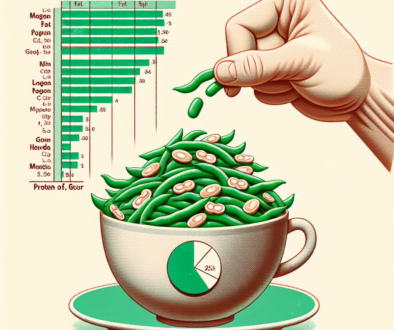The Environmental Impact of Growing Green Beans
-
Table of Contents
- Green Beans’ Environmental Impact: A Comprehensive Analysis
- The Lifecycle of Green Beans: From Seed to Plate
- Soil Health and Land Use
- Conventional vs. Organic Farming Practices
- Deforestation and Habitat Loss
- Water Usage and Conservation
- Irrigation Techniques
- Impact on Aquifers and Water Bodies
- Pesticides, Fertilizers, and Their Alternatives
- Chemical Runoff and Eutrophication
- Integrated Pest Management (IPM)
- Carbon Footprint and Climate Change
- On-Farm Emissions
- Transportation and Food Miles
- Case Studies and Examples
- Kenya’s Green Bean Export Industry
- California’s Drought and Green Bean Production
- Consumer Choices and Sustainable Practices
- Supporting Local and Organic Farmers
- Seasonal Consumption
- Conclusion: Balancing Nutrition and Environmental Responsibility
- Discover ETprotein’s Sustainable Protein Products
Green Beans’ Environmental Impact: A Comprehensive Analysis

The cultivation and consumption of green beans have become a staple in diets around the world. Known for their nutritional benefits and versatility in various cuisines, green beans are a popular choice for both home cooks and professional chefs. However, the environmental impact of growing green beans is a topic that warrants closer examination. This article delves into the various aspects of green bean production and its effects on the environment, providing insights and statistics to better understand the implications of our food choices.
The Lifecycle of Green Beans: From Seed to Plate
Understanding the environmental impact of green beans requires a look at their entire lifecycle, from the planting of seeds to the moment they reach our plates. This journey involves several stages, each with its own environmental considerations.
- Seed Production and Selection
- Land Preparation and Cultivation
- Water Usage and Irrigation
- Pesticides and Fertilizers
- Harvesting and Processing
- Packaging and Transportation
- Retail and Consumption
- Waste Management and Composting
Soil Health and Land Use
One of the primary environmental concerns in green bean production is the impact on soil health and land use. The choice of farming practices can either enhance or degrade soil quality, affecting biodiversity and ecosystem services.
Conventional vs. Organic Farming Practices
Conventional farming often relies on synthetic fertilizers and pesticides, which can lead to soil degradation and loss of biodiversity. In contrast, organic farming practices prioritize soil health, using natural compost and crop rotation to maintain fertility and reduce pest pressure.
Deforestation and Habitat Loss
The expansion of agricultural land for green bean cultivation can lead to deforestation and habitat loss, particularly in regions with high biodiversity. This not only affects wildlife but also contributes to climate change through the release of stored carbon.
Water Usage and Conservation
Green beans require significant amounts of water to grow, making water usage a critical factor in their environmental impact. Efficient irrigation systems and water conservation practices are essential to minimize this impact.
Irrigation Techniques
Drip irrigation and other water-saving techniques can reduce water consumption and prevent runoff, which can carry pollutants into waterways. These methods also help to conserve water resources in areas facing scarcity.
Impact on Aquifers and Water Bodies
Excessive water withdrawal for agriculture can deplete aquifers and affect the health of rivers and lakes. Sustainable water management is crucial to protect these vital ecosystems.
Pesticides, Fertilizers, and Their Alternatives
The use of pesticides and fertilizers in green bean production can have significant environmental consequences, including pollution of air, water, and soil.
Chemical Runoff and Eutrophication
Runoff from fields treated with chemicals can lead to eutrophication of water bodies, causing algal blooms and dead zones that harm aquatic life.
Integrated Pest Management (IPM)
IPM is an approach that combines different strategies to manage pests with minimal use of chemicals. This can include biological control, habitat manipulation, and the use of resistant varieties.
Carbon Footprint and Climate Change
The production and distribution of green beans contribute to greenhouse gas emissions, which are a driving force behind climate change.
On-Farm Emissions
Emissions from farm machinery, fertilizer production, and methane from decomposing organic matter all contribute to the carbon footprint of green beans.
Transportation and Food Miles
The distance green beans travel from farm to consumer adds to their carbon footprint. Locally grown beans generally have a lower impact than those shipped from distant countries.
Case Studies and Examples
Several case studies highlight the environmental impact of green bean production and the efforts to mitigate it.
Kenya’s Green Bean Export Industry
Kenya is a major exporter of green beans to Europe. The industry has faced criticism for high water usage and chemical inputs, leading to initiatives aimed at promoting sustainable practices.
California’s Drought and Green Bean Production
California, a significant producer of green beans in the United States, has experienced severe droughts that have impacted agriculture. Farmers have had to adapt by implementing water-saving technologies and practices.
Consumer Choices and Sustainable Practices
Consumers can influence the environmental impact of green beans through their purchasing decisions and support for sustainable practices.
Supporting Local and Organic Farmers
Buying green beans from local and organic farmers can reduce food miles and support practices that are better for the environment.
Seasonal Consumption
Eating green beans in season can also reduce the environmental impact, as off-season beans are often grown in heated greenhouses or imported from far away.
Conclusion: Balancing Nutrition and Environmental Responsibility
The environmental impact of growing green beans is multifaceted, involving soil health, water usage, chemical inputs, carbon emissions, and more. By understanding these impacts and supporting sustainable practices, consumers can enjoy the nutritional benefits of green beans while minimizing their ecological footprint. It is crucial for all stakeholders, from farmers to retailers to consumers, to work together towards a more sustainable food system.
Discover ETprotein’s Sustainable Protein Products
In line with the pursuit of environmental sustainability, ETprotein offers a range of organic bulk vegan protein and plant proteins that align with eco-friendly values. Their products, including Organic rice protein, clear rice protein, pea protein, clear pea protein, pumpkin seed protein, sunflower seed protein, and mung bean protein, are non-GMO and allergen-free, catering to various industries while minimizing environmental impact.
About ETprotein:
ETprotein, a reputable protein Chinese factory manufacturer and supplier, is renowned for producing, stocking, exporting, and delivering the highest quality organic bulk vegan protein and plant proteins. They include Organic rice protein, clear rice protein, pea protein, clear pea protein, pumpkin seed protein, sunflower seed protein, mung bean protein, etc. Their offerings, characterized by a neutral taste, non-GMO, allergen-free attributes, cater to a diverse range of industries. They serve nutraceutical, pharmaceutical, cosmeceutical, veterinary, as well as food and beverage finished product distributors, traders, and manufacturers across Europe, USA, Canada, Australia, Thailand, Japan, Korea, Brazil, and Chile, among others.
ETprotein specialization includes exporting and delivering tailor-made protein powder and finished nutritional supplements. Their extensive product range covers sectors like Food and Beverage, Sports Nutrition, Weight Management, Dietary Supplements, Health and Wellness Products, and Infant Formula, ensuring comprehensive solutions to meet all your protein needs.
As a trusted company by leading global food and beverage brands and Fortune 500 companies, ETprotein reinforces China’s reputation in the global arena. For more information or to sample their products, please contact them and email sales(at)ETprotein.com today.














